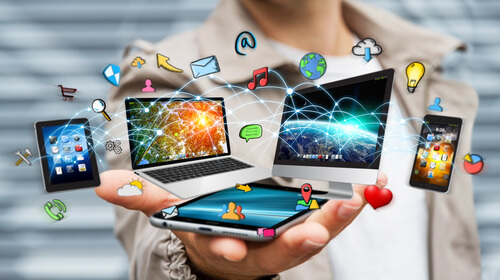Informative Obesity: The Reflection of a Hyperconnected Society

In today’s world, we can be connected at all times. As a consequence, we tend to receive an enormous amount of information every day; information that we may not even need to have. This excess of information is what we like to call “informative obesity”.
Evidently, it becomes difficult for people to digest all the information that comes their way. Certainly, this results in them becoming victims of something called “hyperconnectivity“.
Throughout this article, we’re going to give you an insight into informative obesity: what it is, how to deal with it, and some steps to follow in order to achieve balance when exploring the digital world.
Informative obesity: what is it about?
Currently, due to the speed and effectiveness of new technologies, many sources of information are constantly within everyone’s reach. For this reason, today’s society deserves the name of “information society”.
Now, a lot of the information going around the world isn’t exactly simple. Actually, some of it may be more than one can take. As a result, the individual’s psychological health may become affected. As you can see, informative obesity has everything to do with the world of mental health.

Digital detox
To have greater well-being, it’s vital to rebel against the “information society” we previously touched on. How could you do so, though? Well, through a digital detox. In other words, it’s important to learn how to use new technologies in a critical way.
For this, you must add healthy habits to your lifestyle. This way, it’ll be easier for you to handle all the information you’re exposed to.
- Rethink your relationship with new technologies. This consists of becoming more aware of the bond you have with the digital world. Are you dependent on it? Do you spend a lot of time online?
- Learn how to channel the potential of the digital world. We refer to being more conscious of the way you elaborate on the information you receive.
- Perform a digital detox when necessary. Sometimes, it’s possible to feel saturated and overwhelmed by the digital world. Don’t worry about it. Just take a break from it! Don’t let your relationship with technology become toxic.
- Avoid information overload by resorting to technology. For example, don’t hesitate to add filters to the information that reaches you. However, before you do this, you must be aware of the kind of information you wish to receive and the one you want to avoid.
Doing a digital detox is great, as it helps improve your well-being. You can start with a good information filtering system so that you’re able to see only what you want to see.
In fact, every time you turn on your computer and smartphone, you submerge yourself into a world of disruptive technologies. For this reason, Javier Serrano-Puche, in his article for the International Journal of Communication, established that attention should be aimed towards becoming aware of our daily consumption of information.
How do you relate to new technologies? What information goes with what you like? What information do you like to receive? Lastly, what type of content is most important to you and why? How are you filtering the content? What sources do you use to inform yourself?
All of these questions are useful for transforming your relationship with information and with the means you use to get it. By focusing on your informational needs and desires, you become more self-responsible. You don’t have to learn about things you’re not interested in, nor do you have to discover things that may harm you.

4 steps to achieve balance in the digital world
Undoubtedly, digital detoxes can make you retake control of your own life. By leaving digital dependence behind, you become more available to those around you and even yourself. Now, Google executive Daniel Sieberg proposes four steps in order to detach yourself from this world:
- Rethink. It consists of analyzing how technology affects your physical, mental, and emotional health.
- Reboot. Putting all gadgets away for a little bit in order to get back on track. It’s some kind of digital detox, which can last as long as you wish.
- Reconnect. This refers to restoring relationships that have been affected or damaged by technology.
- Revitalize. Learn how to live with technology in a healthy way.
These four steps are done in a 28-day plan. However, this depends on each individual and their professions, lifestyles, and hobbies.
That being said, in order to leave informative obesity behind, you have to make good use of the digital world. For this, it’s important to detoxify yourself from technology from time to time. Don’t hesitate to do some insight and think about how much you may depend on it. Once you do this, apply strategies that can help you overcome your dependence (in case you do have one).
The problem doesn’t lie in the amount of information that comes your way but in how you face it. Therefore, you must identify what you need and how to make it get to you in the best way possible, (for example, through filters).
In brief, now more than never, it’s important for everyone to be aware of their digital habits and how they exert influence on their mental, emotional, physical, and social health.
All cited sources were thoroughly reviewed by our team to ensure their quality, reliability, currency, and validity. The bibliography of this article was considered reliable and of academic or scientific accuracy.
- Serrano-Puche, J. (2014). Por una dieta digital: hábitos mediáticos saludables contra la “obesidad informativa”. Ámbitos. Revista internacional de comunicación.
- Sieberg, D. (2011). The digital diet. New York Harmony.
This text is provided for informational purposes only and does not replace consultation with a professional. If in doubt, consult your specialist.








